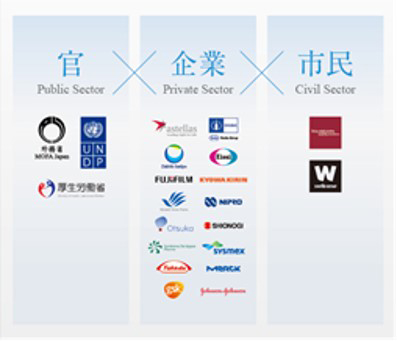Participation in the GHIT Fund and Utilization of Partnerships
The Daiichi Sankyo Group is promoting partnership-based drug discovery to make the best use of its accumulated scientific findings and global network. Partnerships bring synergies to initiatives that cannot be completed by the Group alone. This initiative contributes to Goal 17: “Partnerships for the Goals” of the Sustainable Development Goals (SDGs) adopted by the United Nations member states.
The Daiichi Sankyo Group has funded the Global Health Innovative Technology Fund (hereinafter referred to as the “GHIT Fund”) since its establishment in April 2013. To promote the development of drugs for combating infectious diseases in developing countries, the GHIT Fund was established as a public-private partnership originating in Japan and was supported by the government of Japan, five Japanese pharmaceutical companies, and the Bill & Melinda Gates Foundation. We have provided the funding for the third phase starting in April 2023, ongoingly from the first and second phases. The GHIT Fund has contributed to breakthroughs in many innovative product developments through its investments.
The Group is utilizing the partnership through the GHIT Fund structure to undertake a number of research projects, by integrating our accumulated drug discovery capabilities, our partners' expertise in diseases, and the GHIT Fund’s investment capabilities and its global network.
Daiichi Sankyo will continue with activities that contribute to fulfilling its purpose “to contribute to the enrichment of quality of life around the world,” through initiatives to create innovative pharmaceuticals and improve medical access in developing countries.

The Global Health Innovative Technology Fund
Participation in the AMR Action Fund
The emergence and spread of drug-resistant bacteria is a significant global problem to public health. Presumably, the number of deaths due to infectious diseases caused by bacterial antimicrobial resistance (AMR*) in 2050 across the globe could reach approximately 10 million annually if appropriate countermeasures are not implemented. Against this backdrop,the AMR Action Fund was established in July 2020 in order to support the clinical development of new antibiotics and achieve a sustainable market for antibiotics. The fund aims to commercialize two to four new antibiotics by 2030 by providing a total of US$1.0 billion in investments and technical assistance to several small biotechnology companies. As of the end of December 2023, the fund has announced investments in a total of seven companies. By contributing a total of US$20 million to this fund, Daiichi Sankyo is working to promote the development of innovative antibiotics and thereby contribute to the early resolution of the global AMR problem.
*Abbreviation of Antimicrobial Resistance
AMR Action Fund
Promotion of the Utilization of Research Results in the Manufacturing Technology Association of Biologics
The Daiichi Sankyo Group of companies are promoting the utilization of a new CHO cell strain* (CHO-MK) for the manufacturing of biopharmaceuticals under in-house development. CHO-MK was developed through our participation in the Manufacturing Technology Association of Biologics (MAB) and has productivity (i.e., the ability to produce antibodies, growth rate, and stability in culture) at a world-leading level.
Through cooperation with the MAB’s project, “Development of Advanced Manufacturing Technologies for Continuous Manufacturing”, we are also exploring new opportunities for further technological innovation and open innovation.
*Chinese hamster ovary-derived cell strain used widely for the manufacturing of antibody drugs.